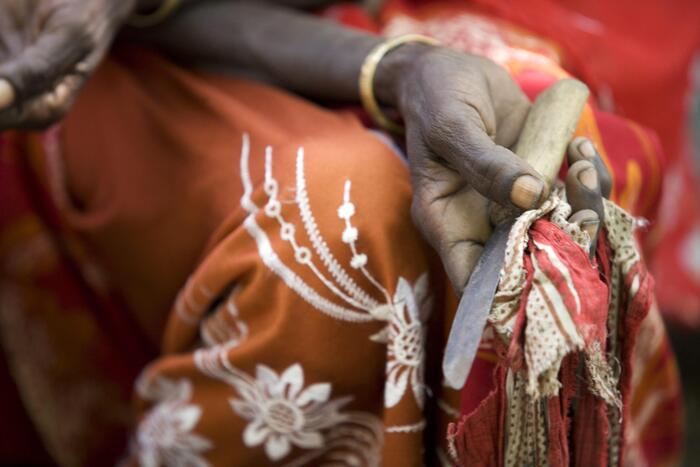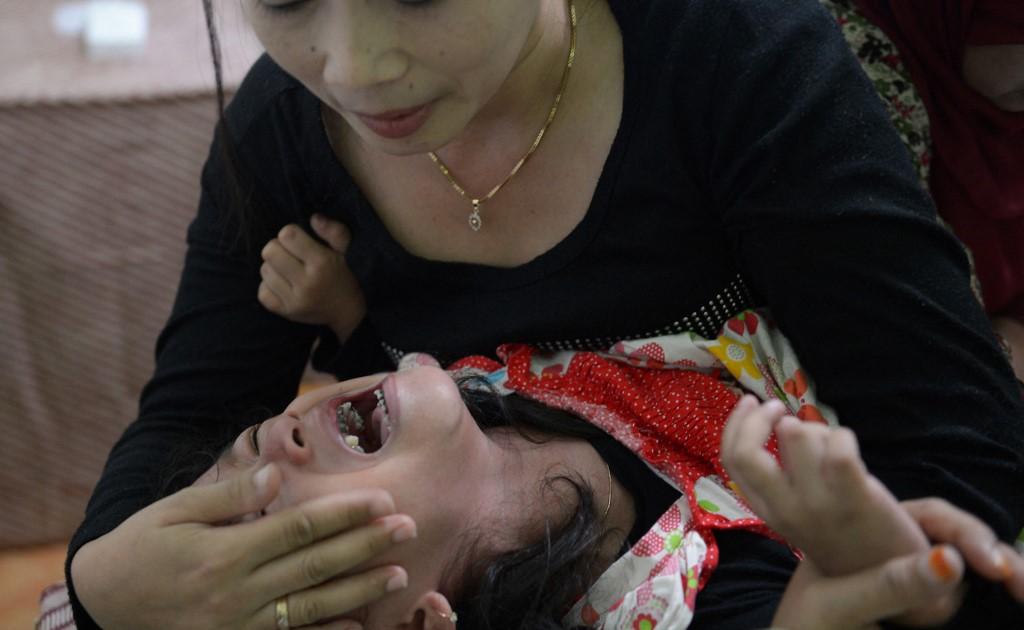Female genital mutilation is a practice that involves altering or injuring the external female genitalia for non-medical reasons.
It is a form of
gender-based violence
and has negative effects on development processes by compromising women's ability to self-determination.
Internationally recognized as a
human rights violation
, an estimated
200 million girls and women worldwide
have undergone some form of female genital mutilation.
While the practice is declining in most of the countries where it is prevalent, most of these are also experiencing high population growth rates, meaning that the number of girls undergoing female genital mutilation will continue to rise if practice continues at current levels.
UNFPA, the United Nations Population Fund, estimates that 68 million girls are at risk of mutilation between 2015 and 2030. A more recent study estimates that
another two million girls are at risk
of this harmful practice due to COVID-19.
Protecting girls will require a significant push to accelerate the elimination of this harmful, often deadly practice.
Coordinated and systematic efforts are needed to end female genital mutilation, involving entire communities and focusing on human rights and gender equality.
The sexual and reproductive health needs of women and girls who undergo the practice and its consequences need to be urgently addressed.
Female genital mutilation (FGM) has very serious consequences on the physical and mental health of girls and boys who undergo it.
World Day of Zero Tolerance against Female Genital Mutilation, which falls on 6 February
, was established by the United Nations precisely to spread ever greater awareness of this harmful practice of human rights, which involves millions of girls and women all over the world.
“Although it is mainly concentrated in 30 countries in Africa and the Middle East – they underline at the United Nations -, the phenomenon of female genital mutilation is a universal problem, also widespread in some countries in Asia and Latin America.
Female genital mutilation continues to occur among immigrant populations living in Western Europe, North America, Australia and New Zealand.
Over the past 25 years, the prevalence of FGM has declined globally.
Today, the chances of a girl experiencing FGM are down by a third compared to 30 years ago.
While these data represent a positive outcome, current humanitarian crises such as epidemics,
In various areas of the world
, the consequences of Covid 19 and the climate crisis are increasing the number of victims of early marriage and genital mutilation.
School attendance, one of the main tools for the emancipation of young women, is also at
risk.
The photograph in
the Terre des hommes InDefense 2022 dossier
.
The consequences of the pandemic continue to erode the rights and threaten the health of girls and young women around the world.
In fact, Covid-19 and the measures taken to contain its spread risk undoing decades of progress achieved in combating female genital mutilation: in sub-Saharan African countries the incidence of the phenomenon has recorded a significant decline over the last thirty years, from 49% of girls between 15 and 19 in 1990 to 34% in 2021. But the difficulties in getting around and the restrictions on movement imposed by many governments between 2020 and 2021 prevented activists and NGO workers for months from reach the villages.
Furthermore, many families have taken advantage of the forced closure of schools to have their daughters - girls or just teenagers - cut their genitals, a ritual that in many countries precedes marriage.
If before Covid-19 the United Nations had predicted that the practice of "cutting" would affect around 68 million girls over the next ten years, the onset of the pandemic has increased
this estimate of an additional two million.
With the migratory phenomenon, FGM has taken on a global dimension and today they are a relevant reality for the relevant EU policies.
It is estimated that around 60/80,000 women and girls live in Italy who live with the consequences of FGM.
In Italy there are specific provisions of the Ministry of Health
: since 2006, there is a specific penal provision relating to FGM: Law n.
7/2006 Provisions concerning the prevention and prohibition of female genital mutilation practices (called the Consolo Law): anyone who practices female genital mutilation is punished with imprisonment from 4 to 12 years, the penalty increased by 1/3 if the mutilation is performed on a minor, as well as in all cases in which it is performed for profit.
Amref Health Africa, a historical reality that has been following the theme for some time and for some years has been proposing
alternative 'rites of passage' to African communities
to initiate a cultural change first of all.
And in Italy?
It has a project to prevent and combat gender-based violence represented by mutilations
through the implementation of an integrated strategy that is able to involve the interested diaspora and the institutional system.
"In this way - they say - we want to give African communities a voice so that they have the opportunity to intervene directly in the decisions that concern them, formulating and presenting recommendations at the local level. Training courses will be held on female genital mutilation and on international protection legislation: the European law on asylum and Italian legislation in fact establish that women who have a well-founded fear of being persecuted or who are exposed to the risk of suffering FGM are eligible for international protection".








